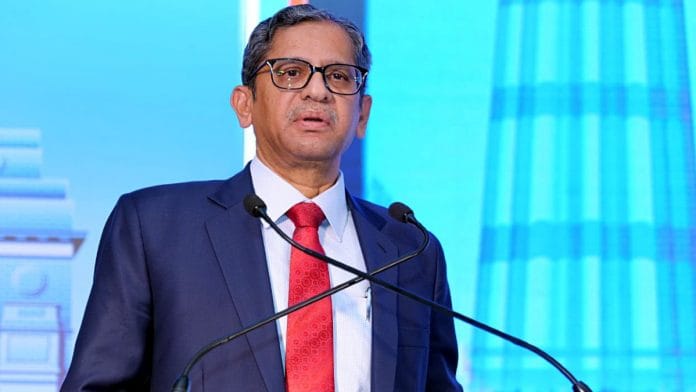New Delhi: The all-India Chief Justices’ Conference, which commences Friday, is expected to focus on improving internet connectivity for district courts, replication of the Supreme Court’s ‘FASTER’ system for speedier, electronic transmission of orders, as well as use of Artificial Intelligence (AI) to improve the justice delivery system, ThePrint has learnt.
Similarly, the ‘Joint Conference of Chief Ministers of States and Chief Justices of High Courts’ — to be held by the Union Ministry of Law and Justice Saturday — will deliberate on Chief Justice of India N.V. Ramana’s proposal to set up a National Judicial Infrastructure Corporation (NJIC), with a view to overcome problems related to the development of judicial infrastructure.
Both conferences are taking place after a gap of six years, sources in the law ministry said. This year’s agenda includes a special emphasis on district judiciary, as it forms the backbone of the judicial system, apart from the issue of judge vacancies in high courts.
Senior officials of the Supreme Court (SC) registry told ThePrint that internet connectivity emerged as a primary concern during the Covid-19 pandemic, when several district courts were unable to function properly due to low bandwidth. In some instances, lawyers from remote areas could not attend courts due to lack of internet connectivity.
“This left many lawyers without work, affecting their families and livelihood,” one of the officials said.
The matter of poor internet connectivity in district courts was brought to the Centre’s notice by CJI Ramana soon after he was sworn in last April. Last year, he wrote to then Union law minister Ravi Shankar Prasad, as well as his successor Kiren Rijiu, seeking redressal of the problem.
“The chief justices are likely to brainstorm on possible models that can be adopted to ensure work does not get affected in case a Covid-like situation surfaces again. Also, once there is resolution among the chief justices, the matter would be discussed on Saturday with the chief ministers to devise a roadmap to bridge the digital divide, particularly in far-flung areas,” the official quoted earlier said.
The first Chief Justices’ Conference was held in 1953. It is usually held once every two years, but the last one, the 38th edition, took place in 2016.
In 1985, the judiciary invited chief ministers to be a part of the deliberations.
“Chief ministers have a big role to play when it comes to introducing reforms in district judiciary. When it was felt that deliberations are not leading to results, the CMs were asked to participate in the conference so that differences could be ironed out and hurdles removed to develop efficient administration of justice,” a law ministry official said.
Also Read: Was there delay in transmitting SC order in Jahangirpuri case? Here’s what is supposed to happen
‘FASTER’, uniform appraisals for judicial officers
The CJI is likely to moot the idea of replicating the SC’s ‘FASTER’ system in high courts and trial courts. Made operational earlier this year, ‘FASTER’ entails electronic transmission of orders, particularly those that grant relief in criminal cases, to prisons so they get implemented without any delay.
Another issue to be deliberated is the absence of a uniform format to assess judicial officers posted in trial courts across the country.
“At present, each state has worked out its own grading and marking system for trial court judges on the basis of which their Annual Confidential Report (ACR) is prepared,” said another official from the SC registry. “If the chief justices agree to having a uniform system to ready ACRs, then it would be discussed with chief ministers in the joint session. Ultimately, the states need to be on the same page if we want a uniform marking system in place.”
Creation of specialised staff or a dedicated Information and Technology (IT) cadre, and hiring of statisticians and data analysts for trial courts are some of the other topics that will be looked into during the conference.
National Judicial Infrastructure Corporation on agenda
As far as the joint conference of the chief justices and CMs is concerned, sources from the law ministry said, the NJIC will be on top of the agenda. While all high courts have positively responded to the CJI’s proposal to set it up, the approval of CMs is yet to be sought, they added.
“At present, states are in control of finances related to the administration of district judiciary,” the law ministry official quoted earlier said. “But the NJIC envisages the creation of two bodies — one at the national level and the other at state level. As per the proposal, both bodies will control finances for upgrading existing judicial infrastructure as well as developing new courtrooms and complexes.”
“This would mean that states would have to give up their control over funds that are allocated to them for the purposes of expending on district judiciary. Therefore, the NJIC is possible only when the states agree to it,” the official added.
The CJ-CMs conference will also delve into institutionalising alternative dispute redressal mechanisms, such as mediation, to lessen the burden on judiciary.
(Edited by Gitanjali Das)
Also Read: Massive caseload, massive vacancies: Inside story of extraordinary mismatch at Allahabad HC






